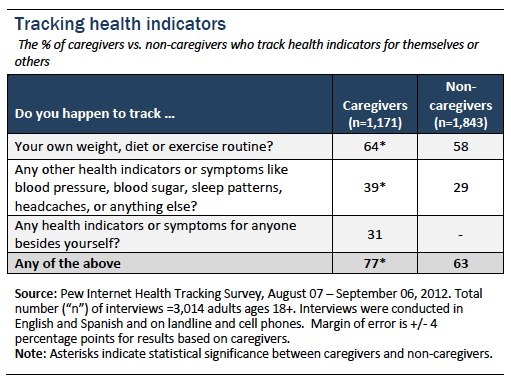Caring and Tracking
Ernesto Ramirez
June 21, 2013
Earlier this year we discussed some very interesting research from the Pew Research Center’s Internet & American Life Project about the role of technology and the Internet in health and healthcare. We were lucky to have Susannah Fox, Associate Director at Pew, talk to us a bit about what it means when 21% of people who track are using some form of technology. Of course, that conversation and that research spawned a few more questions and some interesting insights.
Today we’re looking at some brand new research results coming from Pew that are derived from that same research data set. This time Susannah and her team have focused on a particularly important set of individuals in the health and healthcare space: caregivers. In their recently released report, Family Caregivers are Wired for Health, they found that 39% of adults in the U.S. are caring for child or adult. So why talk about this here? What does that have to do with Quantified Self? Well, it turns out that the people who spend their time and energy caring for the health and wellbeing of others may actually be more engaged in tracking than their non-caregiving counterparts:
Tracking
- 72% of caregivers track their health (weight, diet, exercise, blood pressure, sleep, etc.) while 63% of non-caregivers track their health.
- 44% of caregivers who track say they track their most important indicator “in their heads” (non-caregivers = 53%).
- 43% of caregivers who track say they track their most important indicator using paper (non-caregivers = 28%).
- 31% of caregivers track the health of someone other than themselves.
“When controlling for age, income, education, ethnicity, and good overall health, being a caregiver increases the probability that someone will track a health indicator.”
Sharing
- 41% of caregivers who track share their data with someone else (non-caregivers = 29%).
Impact
- 52% of caregivers who track say it has changed their overall approach to maintaining their health or the health of someone for whom they provide care (non-caregivers = 41%).
- 50% of caregivers who track say it has led them to ask a doctor new questions or to seek a second opinion (non-caregivers = 32%).
- 44% of caregivers who track say it has affected a decision about how to treat an illness or condition (non-caregivers = 26%).
We asked our friend and fellow QS organizer, Rajiv Mehta to comment on this report. When he’s not helping organize our Bay Area QS Meetup, Rajiv has been working on exploring and understanding caregiving.
“Given the prevalence of caregiving (40% of adults) and that 30% of caregivers track something about the person they’re caring for, there’s a lot of opportunity for appropriate tracking and analysis tools. However, caregiving often involves tracking a wide variety of medications, biometrics, symptoms, etc., and design and developing appropriate tools is not easy. I recently wrote about my own experiences in “Self-Care and Caregiving Apps Development.” After all these years of QS meetups and conferences, I can only recall one talk of caregiver tracking (a mother tracking the progress of her baby). Hopefully we’ll see much more over time.”
Please take some time to read the full report and for the data savy, take a look at the preliminary survey data and see what you can find. We would love to hear your thoughts on this new report here in our comments or on our forum.



